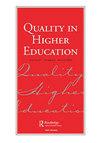Identification of the barriers and factors affecting the quality of higher education in Allameh Tabataba’i university from the viewpoints of faculty members
IF 1.5
Q3 EDUCATION & EDUCATIONAL RESEARCH
引用次数: 3
Abstract
ABSTRACT The aim of this study is to identify and analyse the obstacles and influential factors of the quality of higher education in Allameh Tabataba’i University based on the viewpoints of academic staff. The study was conducted using a phenomenological approach. The research population included 34 academic staff of the university, who were selected using a purposive sampling method. Data collection was performed through semi-structured interviews. The perceptions and experiences of academic staff were analysed using Heidegger’s hermeneutic phenomenological approach. Based on the obtained data, the factors affecting higher education quality at micro and macro levels were identified and categorised with sub-themes. The existing obstacles to the promotion pathway of the higher education quality in Iran were also identified and categorised at the micro and macro levels. The study showed that allocation of increased budget to universities and increasing their autonomy in decision making can improve the quality of higher education.从教职员工的角度分析影响阿拉梅塔巴塔巴大学高等教育质量的障碍和因素
摘要本研究的目的是基于学术人员的观点,识别和分析阿拉梅塔巴塔巴伊大学高等教育质量的障碍和影响因素。这项研究是用现象学方法进行的。研究人群包括34名大学的学术人员,他们采用有目的的抽样方法选择。数据收集是通过半结构化访谈进行的。运用海德格尔的解释学现象学方法分析了学术人员的感知和经验。根据获得的数据,从微观和宏观两个层面确定了影响高等教育质量的因素,并对其进行了分主题分类。本文还从微观和宏观两个层面对伊朗高等教育质量提升途径存在的障碍进行了识别和分类。研究表明,增加对高校的预算拨款,提高高校的决策自主权,可以提高高等教育的质量。
本文章由计算机程序翻译,如有差异,请以英文原文为准。
求助全文
约1分钟内获得全文
求助全文
来源期刊

Quality in Higher Education
EDUCATION & EDUCATIONAL RESEARCH-
CiteScore
3.30
自引率
14.30%
发文量
32
期刊介绍:
Quality in Higher Education is aimed at those interested in the theory, practice and policies relating to the control, management and improvement of quality in higher education. The journal is receptive to critical, phenomenological as well as positivistic studies. The journal would like to publish more studies that use hermeneutic, semiotic, ethnographic or dialectical research as well as the more traditional studies based on quantitative surveys and in-depth interviews and focus groups. Papers that have empirical research content are particularly welcome. The editor especially wishes to encourage papers on: reported research results, especially where these assess the impact of quality assurance systems, procedures and methodologies; theoretical analyses of quality and quality initiatives in higher education; comparative evaluation and international aspects of practice and policy with a view to identifying transportable methods, systems and good practice; quality assurance and standards monitoring of transnational higher education; the nature and impact and student feedback; improvements in learning and teaching that impact on quality and standards; links between quality assurance and employability; evaluations of the impact of quality procedures at national level, backed up by research evidence.
 求助内容:
求助内容: 应助结果提醒方式:
应助结果提醒方式:


